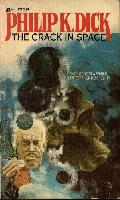Most of the millions of frozen bodies are blacks, referred to as "cols". Presidential candidate Jim Briskin is poised to be the first colored president of the United States. In the racially charged climate of the times, Briskin's agenda is radical; he wants to reanimate the bodies lying frozen in vast government warehouses. He also calls for the destruction of the Golden Door Moments of Bliss satellite - an intergalactic brothel where the richest men go to escape the dull monotony of a pleasureless Earth.
When a door to an alternate world opens, it becomes the job of a huge corporation, Terran Development to make sense of the situation. The story becomes a race for power as the novels protagonists flex their political muscles to solve the world's problems and gain trust and the confidence of the citizens. The alternate worlds seen as either a solution to Earth's overpopulation as a death trap with the future of humanity at stake.
Along the way many strange and unique characters are encountered. Among them are Frank Woodbine and a hot-headed space hero and a two headed mutant/android named George Walt whose heads argue and plot schemes against each other. This is quite an imaginative physical manifestation of schizophrenia!
The Crack In Space is a very political novel of Dick's. It has a similar tone to The World Jones Made. While there are anthropological issues raised in this novel, it has a political story which chronicles a showdown between the forces of government, science and business. It is an entertaining and poignant book but not one of Dick's best. The Crack In Space has all the elements of a great science fiction story and looks at the future (and past) of human existence.
This book is not available through Amazon.com. You might be able to find it through Abebooks or Bibliofind.
Proceed with caution.
The cohesiveness and poignant questioning of Dick's best work are not present in The Crack In Space. The way in which the alternate world is presented is characteristic of Dick's unique speculation. This aspect of the novel seems like it strongest element. In the opinion of this writer, the other events such as those on the "Golden Moments of Bliss Satellite" and the assassination attempts on Briskin are clever and exciting but take away from the significance of the alternate reality. The separate branches of evolution that Dick presents in The Crack In Space are striking. He creates a bold contrast between two species (basically the same) who inhabit the same world. The philosophical implications presented by the encounter with the alternate humans in general and Peking Man specifically are enormous. Dick is asking how humans would respond in this situation. Besides differing physical characteristics, Dick contrasts the evolution of technology and environmental practices between the two species. The Crack In Space is a good example of how Philip Dick is able to raise a lofty philosophical issue in the context of a dramatic and imaginative story. While the events move by at a frantic pace and are filled with suspense and creativity, one is never able to ignore the intellectual complexity of the circumstances or the consequence to the (existing) human race if these events were ever to unfold. Hidden among the futuristic mutants, instantaneous space and time travel and portals to alternate universes the message of The Crack In Space deals with the unlikely way which human history has unfolded. While this may not be Dick's best work, it raises questions unique to this novel. If we were to encounter humans as they were thousands of years ago, how would we react. Although the outward differences seem immense, the burden of the human condition remains no matter which stage of evolution the species is at.
|
